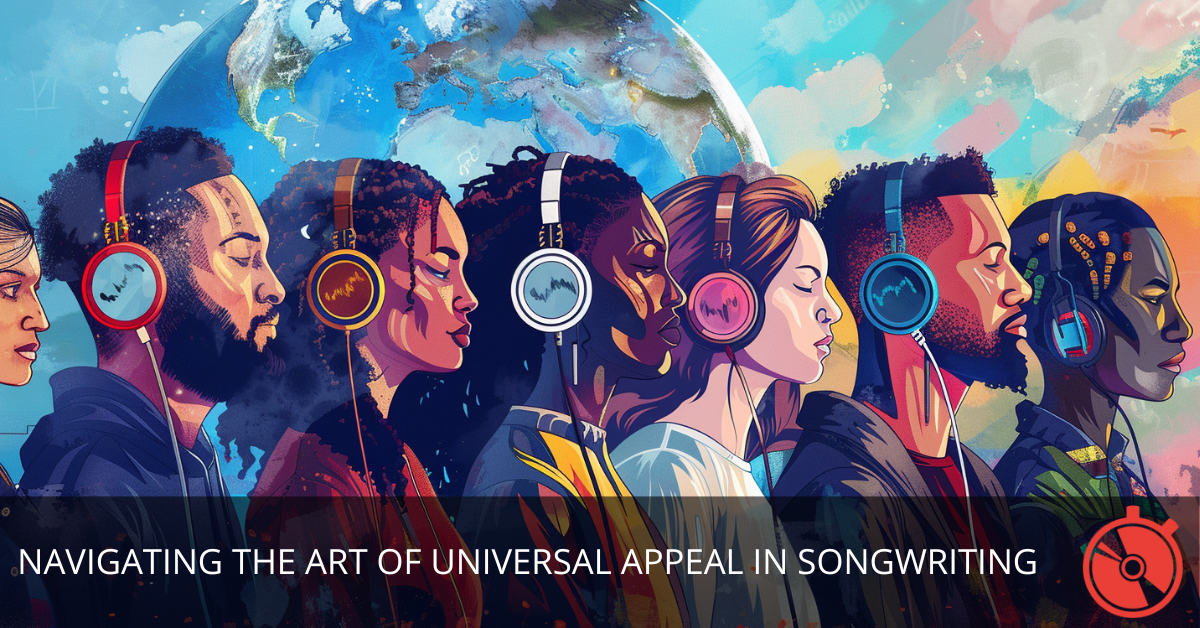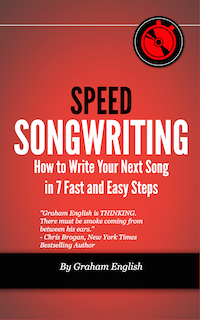
Writing songs that connect with a wide range of listeners is a challenge many songwriters face.
The key is to balance personal stories with themes that resonate with everyone. This approach turns a song into a bridge between different people, making personal experiences relatable to a broad audience.
Creating songs that appeal universally is tough. It requires understanding emotions and experiences beyond cultural and demographic differences, all while keeping true to your artistic vision.
This guide will dive into how to write songs for a broad audience. We'll cover everything from the importance of simplicity and emotional connection to tailoring lyrics for various artists, offering strategies to enhance your songwriting.
Whether you're new to songwriting or an experienced composer looking to reach more listeners, you'll find valuable tips here to make music that crosses boundaries and brings people together.
Let's explore how to make your music resonate widely, from the initial idea to the final performance, by mastering the art of universal songwriting and discovering how to make songs that not only cross genres but also bring unity through music's universal language.
The Balancing Act: Specificity vs. Universality
At the heart of every songwriter's journey lies a pivotal choice: to draw from the well of personal experience, embedding songs with specific, autobiographical details, or to paint with broader strokes, crafting lyrics and melodies that echo universal truths and emotions.
This choice is not merely stylistic—it's foundational, influencing how a song is conceived, developed, and ultimately received by its audience.
Definition of Specificity and Universality in Songwriting
Specificity in songwriting involves tapping into personal or niche experiences, weaving detailed narratives that may resonate deeply with those who have lived similar stories. It's the intimate sketch of a first love under the oak tree by the riverbank, a moment so vividly captured that it transports the listener right there, alongside the songwriter.
Universality, on the other hand, embraces themes, emotions, and experiences that are widely relatable. It seeks common ground, aiming to strike chords that resonate across humanity. Universal songwriting is the anthem that rallies not just a room but stadiums, cutting across the boundaries of culture, age, and time.
Challenges and Benefits
The challenge for songwriters lies in navigating the fine line between these two approaches. Lean too heavily on specificity, and your song may fail to reach listeners who can't see themselves in the narrative. Too much universality, however, and you risk diluting the song's emotional potency, rendering it vague or impersonal.
Yet, therein lies the beauty of songwriting—it's an art form defined by balance and contrast.
The most memorable songs often manage to be both specific and universal. They tell a particular story in such a way that many can find their stories within it. They detail a singular emotion with such clarity and depth that it becomes a mirror reflecting a multitude of feelings across different lives.
Crafting this balance requires a keen understanding of human emotion, a deep empathy for varied experiences, and a judicious use of detail. It's about finding those touchpoints of humanity that, regardless of where we come from or what we've been through, we can all relate to: love, loss, hope, despair, joy, and longing.
Strategies for Universal Songwriting
Writing songs that speak to a wide audience without sacrificing depth or individuality is an art. The following strategies can guide songwriters in creating music that resonates on a global scale.
1. Embracing Universal Themes
Identifying Themes That Resonate Across Cultures and Experiences:
The first step toward universal songwriting is identifying themes that are inherently relatable. Love, freedom, the pursuit of happiness, overcoming adversity, and the search for meaning are experiences that touch everyone in one form or another. Songs that delve into these themes have the potential to reach hearts around the globe.
- Actionable Tip: Make a list of universally relatable themes and brainstorm how your personal experiences or observations tie into these themes. This exercise can help generate song ideas that are both personal and universally appealing.
Examples of Universal Themes in Successful Songs:
- "Anyone" by Justin Bieber explores the theme of vulnerability and the universal need for connection.
- "Rain On Me" by Lady Gaga and Ariana Grande taps into the universal experience of perseverance and finding strength in adversity.
2. Crafting Relatable Lyrics
Tips for Writing Lyrics That Speak to a Broad Audience Without Losing Depth:
The magic of relatable lyrics lies in their ability to convey complex emotions and experiences in a way that listeners from different backgrounds can understand and empathize with.
- Language and Imagery: Use language that is clear and evocative but not so idiosyncratic that it becomes inaccessible. Employ imagery that paints emotions in broad strokes, allowing listeners to fill in the details with their own experiences.
- Cross-Cultural and Demographic Boundaries: Be mindful of references that may not translate well across cultures or demographics. Aim for inclusivity, ensuring that your lyrics do not inadvertently alienate portions of your potential audience.
3. Adapting Lyrics for Different Artists
Understanding the Artist's Persona and Audience:
When writing songs intended for different artists, it's crucial to tailor your lyrics to fit their unique styles and the demographics they appeal to. This doesn't mean compromising your artistic vision but rather adapting it to align with the artist's persona and audience expectations.
- Modifying Lyrical Content: Consider the artist's previous work, public persona, and the themes they typically explore. Adjust your lyrics to complement these aspects, enhancing the song's potential for success under their name.
- Actionable Tip: Research artists you admire or would like to write for. Analyze their most successful songs to understand what themes, lyrical styles, and language resonate with their audience. Use these insights to guide your songwriting process.
Techniques to Maintain Artistic Integrity
In the journey to create music that resonates with a wide audience, it's essential not to lose sight of your voice and vision. Here's how you can ensure your songs remain authentic to you while reaching across the vast expanse of listener demographics.
Balancing Commercial Appeal with Personal Artistic Vision
Finding Your Unique Voice:
Your unique voice is your strongest asset. It's the distinct flavor that sets your music apart in a sea of songs. Even when aiming for universal appeal, ensure your songs carry a piece of you - be it in your lyrical perspective, melodic choices, or thematic focus.
- Actionable Tip: Regularly engage in writing exercises that focus purely on self-expression without the constraints of commercial appeal. This practice helps keep your unique voice alive and ensures it bleeds into your more broad-reaching works.
Commercial vs. Personal:
Understand that commercial appeal often revolves around accessibility and relatability, but it doesn't demand sacrificing your artistic identity. Instead, view commerciality as a challenge to present your unique perspectives in a way that's accessible to many.
Staying True to One's Voice While Writing for a Broad Audience
Incorporating Personal Experiences in Universal Themes:
One of the most effective ways to maintain authenticity is by grounding universal themes in your personal experiences or emotional truths. This approach lends a genuine quality to your music that can resonate more deeply with listeners.
- Example: Adele's music, particularly songs like "Hello," achieves broad appeal by combining deeply personal emotions with universal experiences of loss and longing, all presented through her distinctive vocal and lyrical style.
Adapting Without Losing Yourself:
When adapting your music for different artists or demographics, consider how your core message or story can be framed to fit another's persona without losing its essence. It's about translation, not transformation.
- Practical Exercise: Choose one of your songs and imagine it's being covered by an artist with a very different style. Rewrite a verse or chorus to suit their style while keeping the song's core message intact.
Case Studies: Songs with Universal Appeal
To further illustrate these concepts, let's analyze a couple of recent hits that masterfully balance commercial success with artistic integrity:
- "Shallow" by Lady Gaga and Bradley Cooper: A powerhouse ballad that speaks to the universal search for connection and authenticity, delivered with raw emotional intensity that's unmistakably Gaga.
- "Circles" by Post Malone: Blends genre lines with its melodic hip-hop vibe, discussing themes of running in circles in relationships, a universal feeling conveyed through Post's distinctive vocal style and introspective lyricism.
Shallow by Lady Gaga and Bradley Cooper
"Shallow" from the movie A Star Is Born is an exemplary case of how specificity and universality can be woven into a single piece to touch a broad audience. The song delves deep into personal vulnerability and the quest for authenticity, themes that are both individual and universal. Lady Gaga and Bradley Cooper's impassioned performance brings to life the song's exploration of diving into the unknown, metaphorically represented by the 'shallow'—the space between surface-level existence and the deep end of one's dreams and aspirations.
Analyzing "Shallow" further, the song's universal appeal stems from its ability to encapsulate the human condition's complexities through a specific narrative—two people confronting their fears and encouraging each other to take the leap toward their true selves. This narrative, while unique to its characters, mirrors the existential journey of every individual. The song's lyrical and musical composition—combining powerful, raw vocals with a haunting melody—creates a cathartic experience for listeners. It invites them to reflect on their paths, the moments of decision that shape their lives, and the connections that make those choices worthwhile. "Shallow" stands as a testament to the power of music to transcend the personal, offering both a mirror and a window through which listeners can explore their own depths.
Circles by Post Malone
Post Malone's "Circles" offers a different yet equally compelling study in balancing specificity with universality. The song captures the cyclical nature of a troubled relationship through lyrics that are at once introspective and accessible. Its universal appeal lies in the commonality of its theme—nearly everyone has experienced the frustration and heartache of a relationship that seems doomed to repeat the same mistakes. Yet, it's Post Malone's unique vocal delivery and the blend of genres that imbue the song with a distinctive character.
The genius of "Circles" is its ability to present a specific scenario—being stuck in a loop with someone you love yet struggle to harmonize with—in a way that resonates on a universal level. The song's catchy melody and rhythmic patterns mirror the cyclical theme, creating an immersive listening experience that reflects the emotional turmoil of its lyrics. Beyond its thematic resonance, "Circles" showcases Post Malone's skill in crafting music that straddles genres, incorporating elements of pop, rock, and hip-hop to create a sound that's both familiar and fresh. This cross-genre appeal broadens its reach, making "Circles" a modern anthem for those grappling with the complexities of love and relationship dynamics in today's world.
In both case studies, the songs' universal appeal is not merely a product of their themes but also of their execution—through compelling storytelling, emotive performances, and musical innovation. These elements combine to create works that resonate deeply with a wide audience, showcasing the power of music to connect and reflect our shared human experiences.
Conclusion
Crafting songs with broad appeal doesn't require you to dilute your artistic vision but rather to present it in a way that touches a universal chord.
Balancing commerciality with authenticity is key, and it starts with a deep understanding of both your own artistic identity and the shared human experiences that music can convey.
Remember, the most memorable songs strike a chord not just because they're relatable but because they bring something genuine and unique to the conversation—a piece of the artist's soul.
By staying true to yourself while thoughtfully considering the listener's perspective, you can create music that resonates widely without compromising the essence of who you are as an artist.

Enter your first name and email address below and click “GET ACCESS NOW!” to get the Speed Songwriting Cheat Sheet delivered to your inbox!
We guarantee 100% privacy. Your information will not be shared.

Leave a Reply